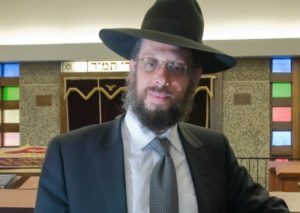A police officer asks an Orthodox man to sign papers on Shabbat. He refuses. An observant woman trips on the sidewalk and a passing policeman offers to help her. She won’t take his hand.
The above behaviors are not intended to be disrespectful. The Orthodox do not sign papers on Shabbat. Obeying the laws of modesty, an Orthodox woman may only touch her husband, male blood relatives and women.
But what if law enforcement officials observe only the behaviors without understanding the motivation?
Earlier this month, Rabbi Tzvi Steinberg of the West Side’s Zera Abraham was one of the speakers at a diversity training session at the police academy to put any misconceptions in their proper context.
Representatives of the Muslim, Vietnamese and Hispanic communities living in the multi-cultural West Side neighborhood also spoke.
But Steinberg explains that his efforts to maintain the good relationships between the police and the Orthodox community started a few months ago.
”Sometime back, there was an abduction in the city,” Steinberg says. “There was some trepidation in our community relating to the incident, so we invited the police to come and provide safety instructions.”
“Sgt. Robert Waidler spoke to the Zera Abraham community — and did a great job,” the rabbi says.
That meeting further aroused his curiosity about the West Side Orthodox community and its culture.
“Later, the police generated a document that describes our culture in relation to law enforcement interaction,” Steinberg says.
“The document presents an in-depth examination of Shabbos and the laws of modesty. It was a fascinating piece,” Steinberg says, ”and helps the law enforcement officer appreciate that certain responses should not be viewed as non-compliant.”
After reading the material, Steinberg came to the station and requested that it hold a larger diversity class for new recruits in District 1, which resulted in the March 6 session.
Asked about specific behaviors he addressed, Steinberg offers several examples.
”If it’s not a life-and-death situation, the Orthodox won’t call 911 on Shabbos,” he says. “If it is life threatening and an officer arrives at the home, we cant sign a report. Why? Because it’s Shabbos.
“When an Orthodox person waves down a police car on Shabbos instead of making a call on his or her cell phone, that also can appear disrespectful,” he says.
”Imagine a simple traffic stop right before the beginning of Shabbos,” Steinberg continues. ”If the police catch an observant Jew committing a minor traffic violation, all we ask is that they make short shrift of the process. Ticket the person and let him go on his way.
“And if the person seems anxious, it’s because he has to get home for Shabbos — not because there’s a body in the trunk!”
Steinberg also says he spent time talking about modesty, specifically the Orthodox emphasis on the separation of the genders. ”Unnecessary physical contact between the genders is discouraged in our community. Even a handshake between the sexes is not allowed. So if I meet male and female police partners, I ask the male officer to shake his partners hand on my behalf.
“It’s that isn’t we believe the police have cooties [a fictional childhood disease],” he laughs. ”We are just following our beliefs.”
Steinberg also learned interesting information about his neighbors.
Phu Do, the Vietnamese speaker and a human services programming specialist for the Denver Housing Authority, brought up a small yet very significant gesture that Steinberg intends to emulate in the future.
He said that if an officer is going through their community and makes a slight bow, it indicates that he’s coming in peace.
”The next time I approach the Vietnamese I’m going to do that.”
Steinberg stresses that pre-existing tensions have never existed between the Orthodox community and District 1.
“I repeated several times that a police officer does not inspire us with fear. He inspires us with security. And we encourage this sense of fraternity.
“The point of this whole exchange is building up and forging relationships, but not because you need to. You do this when things are good. That’s the theme here.”
While some Denver Jews envision the West Side as an ideologically exclusive enclave, Steinberg says nothing could be further from the truth.
”There is a non-Jewish person in our community who experienced a difficult situation recently. Everybody from our shul brought him meals and offered support, emotional and otherwise. Our community was there for him.”
Engendering mutual respect in the community is a fundamental idea in the Talmud, Steinberg says. ”In order to sanctify G-d’s name and fulfill our charge as a light unto the nations, we must be ethical and act morally toward everyone.”
Copyright © 2014 by the Intermountain Jewish News

















